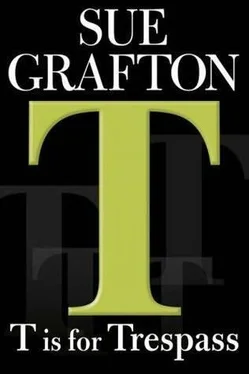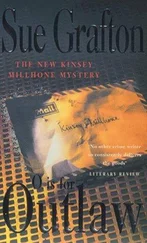“That’s a complete crock of shit. I talked to Melanie myself and it wasn’t like that at all. Sure, Solana called her, but she gave no indication he was in trouble. If she’d known, Melanie would have flown out in a heartbeat.”
The prim mouth again. “Mrs. Rojas says otherwise.”
“Isn’t there supposed to be a hearing?”
“Ordinarily, yes, but in an emergency, the judge can go ahead and grant the request, pending investigation by the court.”
“Oh, right. And suppose the court does the same nifty job you did? Where does that leave Gus?”
“There’s no need to get personal. All of us have his best interests at heart.”
“The man can speak for himself. Why was this done without his knowledge or consent?”
“According to the petition, he has a hearing deficit in addition to periods of confusion. So even if there had been a regular court hearing, he wouldn’t have been competent to attend. Mrs. Rojas said you and his other neighbors don’t fully comprehend the kind of trouble he’s in.”
“Well, we sure as fuck know now. How’d this Tasinato woman get wind of it?”
“She might have been contacted by the convalescent facility or one of his physicians.”
“So however this went down, she now has total control over him? Finances, real property, medical treatment? All of it?”
Ms. Sullivan declined to respond, which I found infuriating.
“What kind of idiot are you! Solana Rojas played you for a fool. She played us all for fools. And look at the result. You’ve handed him over to a pack of wolves.”
The color was rising in Nancy Sullivan’s face and she looked down at her lap. “I don’t think we should continue the conversation. You might prefer to talk to my supervisor. I discussed this with her this morning. We thought you’d be relieved…”
“Relieved?”
“I’m sorry if I upset you. I may have presented it wrong. If so, I apologize. You called, we’ve looked into it, and we’re convinced he’s in capable hands.”
“I beg to differ with you.”
“I’m not surprised. You’ve been antagonistic since I sat down.”
“Stop. Just stop. This is pissing me off. If you don’t get the hell out, I’ll start screaming at you.”
“You’ve already screamed,” she said tightly. “And believe me, this will go in my report.” While she shoved papers in her briefcase and gathered her belongings, I could see the tears splashing down her cheeks.
I put my head in my hands. “Shit. Now I’m the villain of the piece.”
The minute she was out the door, I grabbed my jacket and shoulder bag and trotted over to the courthouse, where I entered a side door and climbed the wide red-tile steps to the corridor above. Arches in the stairwell were open to the chill winter air and my footsteps echoed against the mosaic tile walls. I went into the county clerk’s office and filled out a form, requesting the file on Augustus Vronsky. I’d been in the same place seven weeks previously, doing the background check on Solana Rojas. Clearly, I’d screwed that up, but I wasn’t sure how. I sat in one of the two wooden chairs while I waited, and six minutes later I had the record in hand.
I moved to the far side of the room and sat down at a table, occupied largely by a computer. I opened the file and leafed through, though there wasn’t much to see. I was looking at a standard four-page form. A pale X had been typed into various boxes running down the page. I flipped to the end of the document, where I noted the name of the attorney representing Cristina Tasinato, a man named Dennis Altinova, with an address on Floresta. His phone and fax numbers were listed, as was an address for Cristina Tasinato. Flipping back to the first page, I started again, scanning the headings and subheadings, seeing what I already knew. Augustus Vronsky, designated the conservatee, was a resident of Santa Teresa County. Petitioner was not a creditor or debtor or agent of either. Petitioner was Solana Rojas, asking the court to appoint Cristina Tasinato as conservator for the person and estate of the conservatee. I suspected Solana was at the heart of the matter, but it was still a jolt to see her name neatly typed in the box.
Under “Character and estimated value of the property of the estate,” all the particulars were declared “Unknown,” including real property, personal property, and pensions. A box was also ticked stating that the conservatee was unable to provide for his or her personal needs for physical health, food, clothing, or shelter. Supporting facts were apparently spelled out in an attachment that was part of the Confidential Supplemental Information and Petition “on file herein.” There was no sign of the document, but that’s what the term “confidential” implies. In the paragraph below that, a box was ticked indicating that Gus Vronsky, proposed conservatee, was “substantially unable to manage his or her financial resources or resist fraud or undue influence.” Again, supporting facts were specified in the Confidential Supplemental Information, which had been filed with the petition but was unavailable as part of the public record. The signatures of the attorney, Dennis Altinova, and the conservator, Cristina Tasinato, were penned at the end. The document had been filed with the Santa Teresa Superior Court on January 19, 1988.
Also part of the file was an invoice for “Caregiver management” costs, broken down according to fees, month, and running total. For the latter half of December 1987 and the first two weeks in January 1988, the amount requested was $8,726.73. That sum was substantiated by an invoice from Senior Health Care Management, Inc. There was also an invoice submitted by the attorney for professional services as of January 15, 1988, listing dates, hourly rates, and the amount charged off to the conservatorship. The balance due him was $6,227.47. These expenses had been submitted for court approval, and just in case the routing of funds wasn’t clear, the note at the end read, “Please make checks payable to Dennis Altinova: senior attorney time, $200.00/hour; associate attorney time, $150.00/hour; paralegal time, $50.00/hour.” Between them, the newly appointed conservator and her attorney had racked up charges totaling $14,954.20. I was surprised the attorney hadn’t attached a stamped, self-addressed envelope to speed the payment along.
I marked the pages I wanted reproduced-which is to say, all of them-and returned the file to the clerk. While I waited for copies, I borrowed a phone book and looked up Dennis Altinova in the white pages. Under his office address and phone number, his home address and home phone were listed, which surprised me. I don’t expect doctors and lawyers to make personal information available to anybody smart enough to check. Apparently, Altinova wasn’t that worried about being stalked and killed by a disgruntled client. The neighborhood he lived in was pricey, but in Santa Teresa even houses in the shabby parts of town cost staggering amounts. There were no other Altinovas in evidence. I checked the listings for Rojas: many, but no Solana. I looked for the name Tasinato: none.
When the clerk called my name, I paid for the copies and tucked them in my bag.
Dennis Altinova’s office on Floresta was half a block from the courthouse. The police station was on the same street, which came to a dead end at the point where the Santa Teresa High School property picked up. In the other direction, Floresta crossed State Street, ran past the downtown, and eventually butted up against the freeway. Lawyers had staked out the area, settling in to cottages and assorted small buildings whose original tenants had moved on. Altinova was renting a small suite of offices on the top floor of a three-story building with an off-brand savings and loan at street level. If I remembered correctly, the space had once been devoted to an upholsterer’s shop.
Читать дальше












